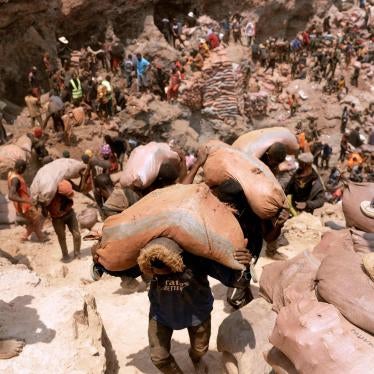Human Rights Watch said today that the key to ensuring that the World Conference Against Racism (WCAR) marked a step forward was ensuring that governments delivered on the anti-racism agenda adopted here.
The WCAR often seemed dominated by acrimonious disputes over the Middle East, including a walk-out by the United States and Israel. But Human Rights Watch said that on many other issues, including the protection of migrants and refugees, repairing the legacy of slavery and equal nationality rights for women, critical progress was made. The United Nations will appoint a panel of five experts to review how countries carry out their commitments.
"If governments would really put in practice what they agreed to here, we could make real headway in combating racism," said Reed Brody, Advocacy Director of Human Rights Watch. "We're pleased that the conference gave the United Nations a strong role in making sure that the promises made in Durban don't die here."
The summit called for far-reaching programs to address intolerance and discrimination against the 150 million migrants in the world, including education campaigns and prevention of workplace bias. It asked countries to combat intolerance against refugees and to protect the more than 30 million people displaced in their own countries. It asked countries to monitor and ensure accountability for police misconduct and to eliminate "racial profiling." The conference called on countries to fund anti-racism efforts and public awareness campaigns in schools and the media. It urged governments to collect data disaggregated by race, which Human Rights Watch said was a first means of identifying and then addressing discrimination in health and the provision of government services.
The conference acknowledged that slavery and the slave trade "are a crime against humanity and should always have been so," and said that states had a "moral obligation" to "take appropriate and effective measures to halt and reverse the lasting consequences of those practices." "This is an historic recognition of the criminality of slavery and the moral obligation to repair its lasting damage," said Brody.
In a significant step, the conference asked countries to allow women the right, on an equal basis with men, to transmit their nationality to their children and spouses, a right denied in many countries, especially in the Middle East and North Africa. Moreover, the conference program of action acknowledges the multiple and unique ways in which racism and sexism interact to deny women their human rights, Human Rights Watch said.
Human Rights Watch noted that the summit, and the five regional meetings which preceded it, had galvanized tens of thousands of victims to voice their demands.
"A great achievement of this process has been the unprecedented mobilization of victims of racism from communities around the world, such as the so-called untouchables of South Asia, the Roma of Europe, and blacks in Latin America who have put their plights squarely on the international agenda," said Brody.
Furious lobbying by the Indian government led to a last-minute removal of references in the conference documents to discrimination based on "work and descent," a reference to the plight of the Dalits, the so-called untouchables.
"India has only fueled international scrutiny by fighting to keep caste out of the final conference documents," said Smita Narula, Senior Researcher at Human Rights Watch. "We have achieved a real victory by forcing a debate here in Durban on the daily discrimination faced by 250 million Dalits around the world."
Human Rights Watch criticized the media focus on the dispute over the Middle East, which accentuated after the walk-out of the United States and Israel.
"This meeting has been about so much more than the Middle East," said Brody. "It has been about refugees, about health, about racism in the application of the death penalty, about the unique ways racism and sexism interact, about repairing the legacy of slavery and colonialism, about the rights of indigenous peoples."








